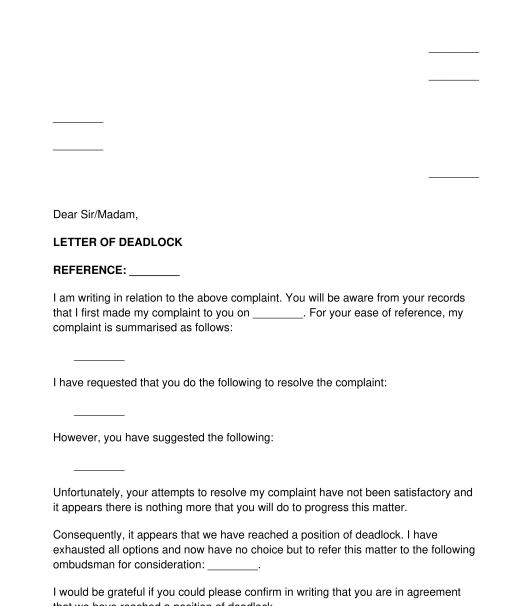 17/11/2025
17/11/2025

Answer a few questions and your document is created automatically.

Your document is ready! You will receive it in Word and PDF formats. You will be able to modify it.

 17/11/2025
17/11/2025
 Word and PDF
Word and PDF
 1 page
1 page
A letter of deadlock can be used by an individual in the United Kingdom before referring a complaint or dispute to an ombudsman. Where a dispute is agreed to be in deadlock it means that both parties have reached a point where no solution can be reached due to a key disagreement regarding the dispute.
A letter of complaint will typically be used in the early stages of a dispute between a consumer and a business. A complaint may be resolved informally following a letter of complaint.
A letter of deadlock is used where no solution has been reached between the parties following a dispute.
A letter of claim or letter of intention to commence the simple procedure is used where the complainant (or claimant) wishes to refer the dispute court. Typically, a person may have exhausted the internal complaints process and the ombudsman complaints process before taking steps to issue a court claim*.
A claimant should always be mindful of all relevant time limits for civil court claims.
Yes. Before going to an ombudsman, it is usually a requirement that a letter of deadlock is produced before the complaint can be looked into by them. This proves to the ombudsman that the parties have attempted to resolve the matter informally and that no solution has been reached.
An ombudsman is a person or entity which is formally appointed to look into and oversee complaints in a specific trade, institution or profession. It is possible to find the relevant ombudsman for certain trades or professions on the Ombudsman Association website.
Before a letter of deadlock may be produced, the parties must have attempted to resolve the matter informally. This will typically involve writing a letter of complaint and following an internal complaints process.
Once the letter of deadlock has been completed, it should be sent to the other party (against whom the complaint is made). The recipient will be given 14 days to respond to the letter.
Where this letter is sent and no response is received within the required timeframe, the sender may then refer the matter to the relevant ombudsman.
It can be helpful to attach background information to the letter of deadlock. For example, this may include:
A letter of deadline should:
The relevant legal and regulatory provisions will depend upon the nature of the dispute.
Each ombudsman will explain whether a letter of deadlock is required and whether any further information is required.
It is possible to find the relevant ombudsman for certain trades or professions on the Ombudsman Association website.
You fill out a form. The document is created before your eyes as you respond to the questions.
At the end, you receive it in Word and PDF formats. You can modify it and reuse it.
A guide to help you: How to Send a Letter
Country: United Kingdom